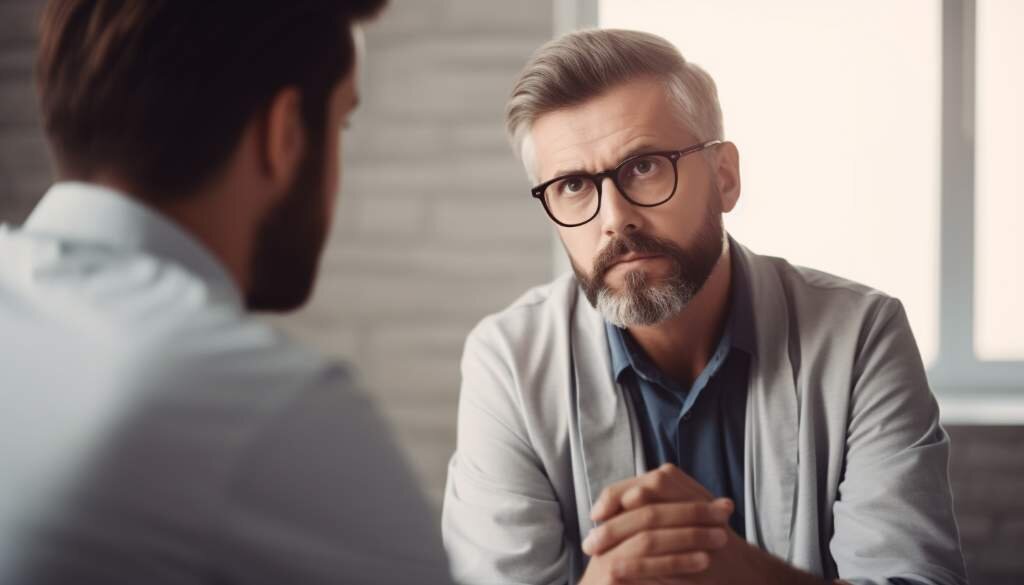
Introduction
The section on testosterone and mental health explores the link between testosterone and various aspects of mental well-being. Before diving into the specific effects, it's important to understand what testosterone is and why mental health is significant.
Testosterone is a hormone found in both males and females, although it is typically associated with male characteristics. It plays a crucial role in various bodily functions, including muscle development, bone density, and reproductive health. Additionally, testosterone also influences mental and emotional well-being.
Mental health refers to a person's emotional, psychological, and social well-being. It affects how individuals think, feel, and act, and it also helps determine how individuals handle stress, relate to others, and make choices. Good mental health is vital for overall well-being and quality of life.
In the upcoming sections, we will explore the effects of testosterone on mental health, discussing topics such as anxiety, depression, spatial abilities, and memory. We will also delve into the research findings related to testosterone's impact on mental health, including functional magnetic resonance imaging studies and the relationship between low testosterone and depression. Additionally, we will explore testosterone therapy and its potential risks.
By understanding the impact of testosterone on mental health and the various aspects involved, individuals can make informed decisions regarding their well-being and seek appropriate medical advice when necessary.
What is testosterone?
Testosterone is a hormone that plays a vital role in the development and maintenance of male reproductive tissues. It is also important for promoting sexual function and secondary sexual characteristics, such as increased muscle mass and bone density. Testosterone is primarily produced in the testicles, although a small amount is also produced in the adrenal glands.
Beyond its impact on physical traits, testosterone also influences mental health and well-being. It has been linked to a range of cognitive functions and emotional states, including mood, anxiety, and spatial abilities.
Testosterone levels in the body can fluctuate naturally throughout the day, with the highest levels typically occurring in the morning and decreasing as the day progresses. However, certain factors can influence testosterone levels, such as age, stress, and overall health.
While testosterone is often associated with male health, it is also present in females, albeit in smaller amounts. In women, testosterone is mainly produced in the ovaries and adrenal glands. It plays a crucial role in maintaining bone density, muscle mass, and libido in women.
Why is mental health important?
Mental health is a crucial aspect of overall well-being, influencing how we think, feel, and act in our daily lives. It encompasses our emotional, psychological, and social well-being, impacting how we handle stress, relate to others, and make choices.
Good mental health is essential at every stage of life, from childhood and adolescence through adulthood. It affects how we handle stress, form relationships, and make decisions. When we have good mental health, we can cope with life's challenges, work productively, and experience a sense of fulfillment.
Mental health is important for several reasons. Firstly, it directly impacts our physical health. Research has shown that poor mental health can contribute to the development of chronic conditions such as heart disease, diabetes, and obesity. Likewise, existing physical health problems can worsen mental health conditions. Therefore, maintaining good mental health is critical for overall physical well-being.
Secondly, mental health plays a crucial role in our ability to form and maintain relationships. When we have good mental health, we are more likely to have positive social interactions, build healthy relationships, and have a strong support system. Conversely, poor mental health can lead to social isolation, strained relationships, and feelings of loneliness.
Furthermore, mental health affects our ability to function effectively in various areas of life. It influences our productivity at work, performance in school, and engagement in everyday activities. Good mental health is associated with increased creativity, problem-solving skills, and overall cognitive functioning. Conversely, poor mental health can hinder our ability to concentrate, make decisions, and carry out daily tasks.
Lastly, mental health has a significant impact on our overall quality of life. When we have good mental health, we are more likely to experience positive emotions, have a sense of purpose, and enjoy life's pleasures. On the other hand, poor mental health can lead to decreased enjoyment, reduced motivation, and feelings of hopelessness.
Given the critical importance of mental health, it is crucial to prioritize it in our daily lives. Taking proactive steps such as engaging in self-care, seeking professional help when needed, and maintaining healthy relationships can contribute to better mental health and overall well-being.

Effects of Testosterone on Mental Health
Testosterone, a hormone predominantly found in males but also present in females, plays a crucial role in various aspects of physical and mental well-being. In this section, we will explore the effects of testosterone on mental health.
Testosterone is known to have a significant impact on several areas of mental health. It affects emotions, cognition, and overall mental well-being. Understanding these effects is important in order to recognize the potential role testosterone plays in mental health conditions.
In the following sub-sections, we will delve into specific areas of mental health that are influenced by testosterone. We will explore the relationship between testosterone and anxiety, depression, spatial abilities, and memory.
Anxiety
Anxiety is a common mental health condition that affects millions of people worldwide. It is characterized by excessive worry, fear, and apprehension. Studies have shown that testosterone levels may play a role in the development and management of anxiety.
Research has found that low testosterone levels can contribute to increased anxiety symptoms. Testosterone has been shown to have anxiolytic effects, meaning it can help reduce anxiety. It does this by regulating the activity of GABA, a neurotransmitter that helps inhibit the brain’s fear response.
In addition to regulating GABA, testosterone also interacts with other neurotransmitters such as serotonin, dopamine, and norepinephrine, which are all involved in mood regulation. Low levels of testosterone can disrupt the balance of these neurotransmitters, leading to increased anxiety.
Furthermore, testosterone deficiency has been associated with an increased risk of developing anxiety disorders. A study published in the Journal of Affective Disorders found that men with low testosterone levels were more likely to have generalized anxiety disorder.
It is important to note that while testosterone may have an impact on anxiety, it is not the sole determinant of the condition. Anxiety is a complex condition that is influenced by various factors, including genetics, environment, and life experiences.
If you are experiencing anxiety symptoms, it is essential to seek medical advice. A healthcare professional can help determine the underlying causes of your anxiety and recommend appropriate treatment options. Treatment may include therapy, medication, or hormone replacement therapy if testosterone deficiency is identified.
Depression
Depression is a common mental health disorder that affects millions of people worldwide. It is characterized by persistent feelings of sadness, hopelessness, loss of interest, and a lack of energy. While several factors contribute to the development of depression, including genetics, environmental factors, and life events, research has shown that testosterone levels may also play a role in the onset and severity of depressive symptoms.
Studies have found a link between low testosterone levels and an increased risk of developing depression. Testosterone is a hormone that is primarily produced in the testes in men and in the ovaries and adrenal glands in women. It plays a crucial role in various bodily functions, including mood regulation.
Low testosterone levels have been associated with symptoms commonly seen in depression, such as fatigue, irritability, and a decreased sense of well-being. In addition, low testosterone levels can also lead to decreased motivation, difficulty concentrating, and a decreased interest in previously enjoyed activities.
One study conducted on men with depression found that those with lower testosterone levels showed more severe depressive symptoms compared to those with normal testosterone levels. The study also found that testosterone replacement therapy in men with low testosterone levels and depression led to an improvement in depressive symptoms.
It is important to note that while low testosterone levels may contribute to the development of depression, it is not the sole cause. Depression is a complex condition that requires a comprehensive approach to treatment, involving therapy, medication, lifestyle changes, and support from healthcare professionals.
Spatial abilities
Testosterone not only plays a pivotal role in physical health and sexual characteristics but also has a significant impact on mental health. One area of mental health that is affected by testosterone is spatial abilities. Spatial abilities refer to the capacity to understand and manipulate visual representations of objects and their relationships in space.
Research has shown that testosterone levels can influence spatial abilities in both men and women. Studies have consistently found that higher levels of testosterone are associated with better spatial abilities. For example, a study published in the journal ‘Hormones and Behavior' found that individuals with higher testosterone levels performed significantly better on spatial ability tasks compared to those with lower levels of testosterone.
One potential reason for this link between testosterone and spatial abilities is that testosterone has been shown to have an impact on the development and organization of the brain regions involved in spatial processing. Research using neuroimaging techniques has revealed that testosterone affects the structure and function of the hippocampus and the parietal cortex, both of which are crucial for spatial cognition.
In addition to the role of testosterone in spatial abilities, this hormone has also been implicated in other aspects of mental health. It has been associated with enhanced memory, cognitive function, and overall brain health. However, the effects of testosterone on mental health can vary depending on individual differences, such as age, gender, and overall health.
It is important to note that while testosterone may have a beneficial impact on spatial abilities, it is not the sole determinant. Factors such as genetics, upbringing, and environmental stimuli also play significant roles in the development and expression of spatial abilities.
Memory
Testosterone not only plays a crucial role in physical health but also has a significant impact on mental well-being. One particular aspect of mental health that testosterone affects is memory.
Memory refers to the ability to encode, store, and retrieve information. It plays a vital role in our daily lives, helping us learn new things, make decisions, and recall past experiences. Research suggests that testosterone levels can influence various aspects of memory.
In terms of short-term memory, studies have found that higher levels of testosterone are associated with better working memory performance. Working memory is responsible for holding and manipulating information in the mind for short periods of time. This can be particularly important in tasks that require attention, reasoning, and problem-solving.
Furthermore, testosterone has also been linked to long-term episodic memory, which involves remembering specific events, experiences, and personal details. Research shows that testosterone can enhance the encoding and retrieval of episodic memory. It is believed that testosterone's impact on memory is influenced by its effects on the hippocampus and other brain regions involved in memory formation and consolidation.
However, it is worth noting that the relationship between testosterone and memory is complex and can be influenced by various factors. For instance, age, sex, and individual differences can modulate the effects of testosterone on memory. Additionally, certain hormonal disorders or medical conditions that affect testosterone levels can also impact memory function.
Overall, the role of testosterone in memory is an intriguing area of research. While higher testosterone levels have been associated with improved working memory and episodic memory, further studies are needed to fully understand the mechanisms and potential therapeutic applications of testosterone in memory enhancement.

Research Findings
Research findings refer to the results and conclusions derived from scientific investigations and studies conducted on a specific topic. In the context of this section, research findings pertain to the relationship between testosterone and mental health. This section will explore various studies that have shed light on the effects of testosterone on mental health, including anxiety, depression, spatial abilities, and memory. It will also delve into the use of functional magnetic resonance imaging (fMRI) to understand the neural mechanisms underlying testosterone's impact on mental well-being. Additionally, the section will discuss the connection between low testosterone levels and depression, as well as the overall psychological health status of men with varying levels of testosterone. Finally, it will touch upon how low testosterone levels can influence mood. The subsequent subsections will provide more detailed information on each of these research findings, further enhancing our understanding of the relationship between testosterone and mental health.
Functional magnetic resonance imaging in humans
Functional magnetic resonance imaging (fMRI) is a powerful tool used in neuroscience and psychology to understand the brain's functional organization. It allows researchers to examine the brain's activity by measuring changes in blood flow and oxygenation levels. Several studies have used fMRI to investigate the effects of testosterone on mental health.
One study conducted by researchers at the University of Michigan examined the neural response to emotional stimuli in participants with varying testosterone levels. They found that individuals with higher testosterone levels showed enhanced activity in brain regions associated with emotional processing, such as the amygdala. This suggests that testosterone may modulate emotional reactivity and play a role in emotional regulation.
Another study published in the Journal of Cognitive Neuroscience investigated the influence of testosterone on social cognition. The researchers used fMRI to assess brain activation patterns while participants performed facial emotion recognition tasks. They found that higher testosterone levels were associated with increased activation in brain areas involved in processing facial expressions, suggesting that testosterone may enhance social cognition abilities.
In addition to emotional and social processing, fMRI studies have also explored the impact of testosterone on cognitive functions. For example, a study conducted by scientists at the University of Western Ontario examined the effects of testosterone on spatial abilities. They discovered that individuals with higher testosterone levels showed improved performance on spatial navigation tasks and exhibited increased activation in brain regions responsible for spatial processing.
Overall, these fMRI studies provide valuable insights into the effects of testosterone on various aspects of mental health. They demonstrate that testosterone can influence emotional reactivity, social cognition, and cognitive functions such as spatial abilities. However, it is important to note that these findings represent snapshots of brain activity and further research is needed to fully understand the complex relationship between testosterone and mental health.
Low testosterone and depression
Research has shown a strong association between low testosterone levels and depression. When testosterone levels drop below normal, it can have a significant impact on mental health, increasing the risk of developing depressive symptoms.
One study conducted by the National Institute of Mental Health found that men with low testosterone were four times more likely to experience depression compared to men with normal testosterone levels. Low testosterone levels have been linked to feelings of sadness, hopelessness, and a general lack of interest in activities that were once enjoyable.
The exact mechanism by which low testosterone contributes to depression is not fully understood. However, it is believed that testosterone plays a role in regulating neurotransmitters like serotonin, dopamine, and norepinephrine, which are essential for maintaining mood stability and overall emotional well-being. When testosterone levels are low, it can disrupt the delicate balance of these neurotransmitters, leading to depressive symptoms.
Furthermore, research has also shown that testosterone replacement therapy can be effective in improving depressive symptoms in men with low testosterone. A study published in the Journal of Clinical Psychopharmacology found that testosterone therapy significantly reduced symptoms of depression, anxiety, and irritability in men with low testosterone levels.
It is important to note that low testosterone is not the sole cause of depression, and there are multiple factors that can contribute to developing depression. However, addressing and treating low testosterone levels can have a positive impact on mental health and overall well-being.
Testosterone levels and psychological health status in men
Research studies have shown a correlation between testosterone levels and psychological health status in men. Testosterone is a hormone that plays a crucial role in the development and maintenance of male reproductive tissues, as well as other secondary sexual characteristics.
One important aspect of psychological health in men is their overall well-being and quality of life. Several studies have found that men with lower testosterone levels tend to have a higher prevalence of depressive symptoms and a lower quality of life compared to men with normal testosterone levels.
Additionally, individuals with low testosterone levels may experience increased irritability, fatigue, and a reduced sense of motivation. These symptoms can significantly impact their mood and overall mental health.
Another significant finding is that men with low testosterone levels often report reduced sexual desire and erectile dysfunction. This can lead to increased stress and anxiety, further affecting their psychological well-being.
Furthermore, testosterone levels have been found to be associated with cognitive function. Studies have shown that lower testosterone levels are linked to decreased cognitive abilities such as impaired memory and reduced spatial abilities.
It is important to note that while testosterone levels can have an impact on psychological health, they are not the sole determining factor. Other factors such as genetics, lifestyle, and environmental factors also play a role in mental health.
Overall, the research suggests that maintaining healthy testosterone levels is important for both physical and psychological well-being in men. If you suspect you have low testosterone levels or are experiencing symptoms related to mental health, it is recommended to seek medical advice. Your healthcare provider can evaluate your symptoms, conduct appropriate tests, and provide guidance on potential treatment options.
How low testosterone impacts mood
Research has shown that low testosterone levels can have a significant impact on mood. Testosterone is a hormone that plays a crucial role in regulating various bodily functions, including mental health. When testosterone levels are low, it can lead to disruptions in mood and emotional well-being.
One of the most noticeable ways that low testosterone impacts mood is by increasing the risk of developing mood disorders such as depression. Studies have found a strong link between low testosterone levels and an increased likelihood of experiencing depressive symptoms. This is thought to be due to the role that testosterone plays in regulating mood and emotions. Low testosterone can lead to feelings of sadness, irritability, and a general lack of motivation.
Additionally, low testosterone can also contribute to increased levels of anxiety. Testosterone has a calming effect on the brain and helps regulate stress levels. When testosterone levels are low, individuals may experience heightened feelings of anxiety and tension. This can manifest as constant worrying, restlessness, and even panic attacks.
Furthermore, spatial abilities, which involve mental rotation, spatial perception, and navigation skills, can be affected by low testosterone levels. Testosterone plays a key role in the development and maintenance of spatial cognition. Research has found that low testosterone levels can impair spatial abilities, making it more difficult for individuals to navigate their environment and perform spatial tasks.
Memory is another aspect of mental health that can be affected by low testosterone. Testosterone helps in the formation and consolidation of memory. When testosterone levels are low, individuals may experience difficulties in learning and remembering new information. This can have a significant impact on daily functioning and overall cognitive abilities.
In conclusion, low testosterone can have a profound impact on mood and mental health. It can increase the risk of developing mood disorders such as depression and anxiety, impair spatial abilities, and affect memory. If you suspect that your testosterone levels may be low and are experiencing mood-related symptoms, it is important to seek medical advice. A healthcare professional can help determine the underlying cause of your symptoms and recommend appropriate treatment options.

Testosterone Therapy
Testosterone therapy, also known as androgen replacement therapy, is a medical treatment that involves the use of testosterone to increase the levels of this hormone in the body. Testosterone is a vital hormone primarily found in men, although women also produce it in smaller amounts. It plays a crucial role in various bodily functions, including the development of male reproductive tissues, maintaining muscle mass and strength, and regulating sex drive.
In this section, we will explore different aspects of testosterone therapy and its effects on mental health. We will discuss the potential benefits as well as the potential risks associated with this treatment.
Specifically, we will delve into how testosterone therapy can impact conditions such as anxiety and depression. We will also explore its effects on spatial abilities and memory, providing insights into the role of testosterone in cognitive function.
Additionally, we will examine relevant research findings that shed light on the relationship between testosterone levels and psychological health status in men. We will discuss studies that have utilized functional magnetic resonance imaging to understand the neurobiological mechanisms underlying testosterone's effects on mental health.
While testosterone therapy can offer potential benefits, it is essential to consider the potential risks and side effects. We will highlight some of the possible risks associated with this treatment and provide a balanced perspective.
By exploring the various aspects of testosterone therapy, this section aims to provide a comprehensive overview of the topic, helping you understand the potential impact of testosterone on mental health.
Testosterone therapy
Testosterone therapy is a treatment option for individuals with low levels of testosterone. It involves the administration of testosterone to increase hormone levels in the body. This therapy is commonly used to address symptoms such as low libido, fatigue, and mood changes that are associated with low testosterone levels.
There are different forms of testosterone therapy available, including injections, gels, patches, and pellets. The choice of treatment depends on various factors such as the severity of testosterone deficiency, individual preferences, and the advice of a healthcare professional.
Testosterone therapy can have several benefits for individuals with low testosterone levels. It can help improve mood, increase energy levels, enhance sexual function, and improve cognitive abilities. Many individuals report an overall improvement in their quality of life and well-being with testosterone therapy.
However, it is important to note that testosterone therapy is not without potential risks. Common side effects include acne, fluid retention, breast enlargement, and an increased risk of prostate enlargement. In some cases, testosterone therapy can also increase the risk of blood clots and cardiovascular problems. Therefore, it is crucial to consult with a healthcare professional before considering testosterone therapy, particularly for individuals with a history of heart disease, prostate cancer, or certain other medical conditions.
In conclusion, testosterone therapy can be an effective treatment option for individuals with low testosterone levels. It can help alleviate symptoms and improve mental and physical well-being. However, it is essential to weigh the potential risks and benefits and consult with a healthcare professional before starting testosterone therapy.
Potential risks of testosterone therapy
Testosterone therapy is a treatment option that involves the administration of testosterone to increase the levels of this hormone in the body. While it can be beneficial for individuals with low testosterone levels, it is important to be aware of the potential risks associated with this therapy.
One potential risk of testosterone therapy is the development of cardiovascular issues. Studies have shown that testosterone supplementation can increase the risk of heart attacks, strokes, and other cardiovascular events. It is believed that testosterone may promote the formation of blood clots, which can block the blood vessels and lead to these serious complications. Therefore, individuals with a history of heart disease or those who are at an increased risk should proceed cautiously and consult with their healthcare provider before considering testosterone therapy.
Another potential risk is the development or exacerbation of prostate problems. Testosterone is known to stimulate the growth of the prostate gland, which can lead to benign prostatic hyperplasia (BPH) or prostate cancer. For individuals with a history of prostate issues or those at a higher risk, it is crucial to discuss the potential risks and benefits of testosterone therapy with their doctor.
One concern related to testosterone therapy is its impact on fertility. Testosterone therapy can suppress sperm production and fertility in men. Therefore, individuals who are planning to have children should discuss the potential impact of testosterone therapy on fertility with their healthcare provider.
Additionally, testosterone therapy can lead to several side effects. These can include acne, oily skin, fluid retention, breast enlargement, and sleep apnea. It is essential to monitor for these side effects and consult with a healthcare professional if they occur.
It is important to note that testosterone therapy should only be undertaken under the guidance and supervision of a qualified healthcare professional. They will be able to assess whether testosterone therapy is appropriate for an individual's specific situation and monitor for any potential risks or complications.

Conclusion
Conclusion
In conclusion, testosterone plays a significant role in mental health. It affects various aspects such as anxiety, depression, spatial abilities, and memory. Research findings using functional magnetic resonance imaging in humans have provided insights into the impact of testosterone on brain function. Additionally, studies have shown a correlation between low testosterone and depression, as well as psychological health status in men.
Testosterone therapy is available as a treatment option for individuals with low testosterone levels. However, it is important to consider the potential risks associated with testosterone therapy. Seeking medical advice before starting any treatment is crucial.
The impact of testosterone on mental health
Testosterone, a hormone primarily associated with male development and reproductive functions, also plays a crucial role in mental health. Studies have shown that testosterone levels can have a significant impact on various aspects of mental well-being, including mood, cognition, and overall psychological health.
One of the key areas where testosterone influences mental health is anxiety. Research has demonstrated that low testosterone levels can contribute to increased feelings of anxiety and nervousness. Conversely, maintaining optimal testosterone levels can help reduce anxiety symptoms and promote a calmer state of mind.
Depression is another mental health condition that is influenced by testosterone. Studies have found a strong correlation between low testosterone levels and an increased risk of developing depression. Testosterone therapy has shown promising results in alleviating depressive symptoms, especially in individuals with low testosterone levels.
Spatial abilities, which refer to the capacity to visualize and manipulate objects in three-dimensional space, are also affected by testosterone. Higher testosterone levels have been linked to enhanced spatial abilities, such as better navigation skills and mental rotation. On the other hand, low testosterone levels may contribute to difficulties in spatial cognition.
Memory is another cognitive function that can be influenced by testosterone. Research suggests that testosterone plays a role in memory formation and retrieval. Optimal testosterone levels have been associated with improved memory performance, especially in tasks related to verbal and spatial memory. Maintaining adequate testosterone levels can, therefore, have a positive impact on memory function.
Overall, the impact of testosterone on mental health is substantial. By regulating emotions, cognition, and overall psychological state, testosterone plays a crucial role in maintaining good mental well-being. It is important to note that individual experiences may vary, and the influence of testosterone on mental health can be influenced by various factors, including age, health conditions, and lifestyle choices.
If you suspect that your testosterone levels may be affecting your mental health, it is essential to seek medical advice. A healthcare professional can assess your hormone levels and provide guidance on potential treatment options, such as testosterone therapy. It is important to approach any hormone-related treatment under the supervision of a qualified medical professional to ensure safety and effectiveness.
The importance of seeking medical advice
Seeking medical advice is essential when it comes to testosterone and mental health.
If you suspect that you might be experiencing symptoms related to low testosterone or if you have concerns about your mental health, it is important to consult with a healthcare professional. While this article provides information on the effects of testosterone on mental health, it is not a substitute for professional medical advice.
A qualified healthcare provider can assess your symptoms, conduct necessary tests, and provide an accurate diagnosis. They can also recommend appropriate treatment options based on your individual needs and circumstances.
Additionally, seeking medical advice ensures that any potential underlying health conditions are properly identified and addressed. There may be other factors contributing to your mental health concerns, and a healthcare provider can help you explore all the possible causes.
Furthermore, testosterone therapy, which can be used to treat low testosterone levels, should only be pursued under the guidance of a medical professional. While testosterone therapy can have positive effects on mental health in certain cases, it is not suitable or necessary for everyone.
In conclusion, if you are experiencing symptoms related to low testosterone or if you have concerns about your mental health, it is crucial to seek medical advice. A healthcare provider will be able to provide you with the necessary support, guidance, and treatment options to help improve your overall well-being.








